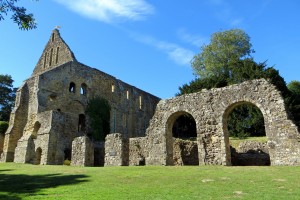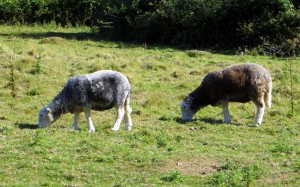My three-year research project on multilingual practices in England in the ‘long twelfth century’ ended in August, when its last research trip took me to the UK for the sixth time since 2012. In addition to doing library work, I paid a visit to the place where my long century began: Hastings, on the south coast, and the small town of Battle, which is just fifteen minutes from Hastings by train and, despite its fierce name, quite a sleepy place today. Hastings is a pleasant seaside town, a lively resort on a sunny Sunday afternoon in August but quiet and a little sad on a grey Monday morning.
All students of British history associate Hastings with the battle that won Duke William of Normandy the crown of England on 14th October, 1066. The fighting actually took place outside Hastings itself, at a site where a few years after his victory William the Conqueror built a monastery. The spot where England’s King Harold lost his life on that bloody day was where the high altar of the Battle Abbey church was located.
Over ten thousand men fought in the battle that changed the course of history in just one day. On a sunny summer’s day centuries later, this is quite hard to imagine, especially as the battlefield is now a meadow with grazing sheep, inside what is perhaps best described as a not particularly well looked-after park. The walk around the battlefield takes little more than half an hour, and although there are tourists pottering about, they are outnumbered by the sheep. The Abbey is now in ruins, but the site, run by English Heritage, is still interesting to visit. The village of Battle makes the most of the historic significance of the place; even one of the restaurants serves lunches that cost exactly £10.66.
The consequences of the battle of Hastings and the Norman Conquest more broadly include social, political and cultural changes – and also linguistic ones, as French gained a new, prominent position in England. It was English lexis in particularly that was influenced by language contact; the previous sentence alone contains at least half a dozen words of French origin. As a historical linguist, I hope that the linguistic legacy of the Conquest is also remembered next year – the 950th anniversary of the Battle of Hastings.
Text and photos by Janne Skaffari.


Thanks! Very interesting.
Other European battles in 1066 include the battle between the two Erics (from the Segersäll and the Stenkil dynasties) for the throne of Sweden resulting in the death of them both in 1067 (http://notisa.com/kungahuset2.html), and the Granada massacre in December (http://jewishcurrents.org/december-30-the-grenada-massacre-13617).